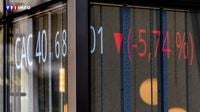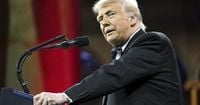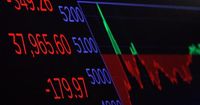On April 9, 2025, a new wave of tariffs imposed by the United States took effect, targeting approximately 60 countries, with a staggering total rate of 104% applied against China. This monumental increase has sent shockwaves through global markets, igniting tensions in international trade and raising concerns about the economic repercussions.
In response to the tariffs, Russia has publicly condemned President Donald Trump's decision, asserting that it undermines fundamental rules of the World Trade Organization (WTO). Maria Zakharova, a spokesperson for Russian diplomacy, criticized the U.S. stance, stating, "The latest customs decision from the White House... violates the fundamental rules of the WTO and shows that Washington does not consider itself bound by international trade norms." This sentiment reflects a broader concern about the implications of the escalating trade war between the world's two largest economies.
Meanwhile, the Governor of the Bank of France, François Villeroy de Galhau, has estimated that the trade war initiated by the United States would have a limited impact on inflation in Europe. He projected a direct reduction of 0.25 points on the GDP of the eurozone, emphasizing that there would likely be little to no effect on inflation. "In Europe, there is an effect on growth," he stated, reinforcing the idea that while the economic landscape is shifting, it may not result in immediate inflationary pressures.
Amidst these developments, the Italian government announced it would lower its growth forecast for 2025 to 0.6% from a previous estimate of 1.2%. This adjustment underscores the economic storm triggered by the U.S. tariffs, which have raised significant concerns regarding the stability of European economies.
In a white paper published on the same day, China expressed its willingness to resolve trade and economic disputes with the United States through equitable dialogue. The document stated, "China and the United States can resolve their economic and trade disputes through dialogue on an equal footing and mutually beneficial cooperation." This call for dialogue comes amid heightened tensions and a firm stance from Beijing regarding the tariffs.
China's response to the tariffs has been characterized by a promise of "firm and vigorous measures" to defend its interests. Lin Jian, a spokesperson for the Chinese Ministry of Foreign Affairs, declared, "The legitimate right to development of the Chinese people is inalienable, and the sovereignty, security, and development interests of China are inviolable." This declaration highlights China's determination to stand firm against U.S. trade policies.
The impact of these tariffs was immediately felt in the financial markets. European stock exchanges opened sharply lower, with Paris, Frankfurt, London, and Milan all experiencing significant declines. The Paris Bourse fell by 2.78%, while Frankfurt decreased by 2.20%. In Asia, the Tokyo Stock Exchange closed down by 3.93%, with the Nikkei index plunging to 31,714.03 points. The Hong Kong Stock Exchange also saw a decline of over 3% in early trading.
In Taiwan, the local Taiex index dropped by 5.8%, closing at 17,391.76 points, despite the government's activation of a $15 billion stabilization fund. This downturn reflects the broader anxiety gripping markets as investors react to the uncertainty surrounding the U.S.-China trade relationship.
South Korea has also taken steps to address the economic fallout from the tariffs, announcing an emergency aid package of 1.7 billion francs to support its automobile manufacturers, who are heavily reliant on exports. The country is facing an additional 25% tariff on imported vehicles to the United States, which poses a significant threat to its automotive sector.
As the trade war escalates, the South Korean won fell to its lowest level against the dollar since 2009, highlighting the currency's vulnerability in the face of global market instability. This decline reflects broader concerns about the economic impact of the tariffs on countries that rely heavily on exports.
Despite the turmoil, Partners Group, a Zug-based asset manager, assessed that the tariffs would only lead to a 1 to 3% decrease in aggregate EBITDA across its direct portfolio. They expect that 93% of their portfolio value will either be excluded from the tariffs or only modestly affected in terms of profits.
In the wake of these developments, Donald Trump has expressed confidence in negotiating "tailor-made agreements" with trading partners, including Japan and South Korea. He commented, "Everything is going very well for us; we are making what I call tailor-made agreements, not off-the-rack, but haute couture." This assertion reflects Trump's ongoing commitment to a protectionist trade policy.
However, the repercussions of these tariffs extend beyond immediate economic concerns. The CEO of UBS, Sergio Ermotti, criticized the situation as "uncontrollable," highlighting the uncertainty that will persist in the wake of the tariffs. He noted, "I never thought it would become this uncontrollable," indicating the widespread anxiety among global financial leaders.
As markets react to the unfolding situation, the potential for a broader economic crisis looms. The implications of the U.S. tariffs are being felt not only in the financial sector but also in various industries across the globe. The trade war has raised questions about the future of international trade relations and the stability of global markets.
In conclusion, the new tariffs imposed by the United States are reshaping the landscape of international trade, causing ripples across global markets and prompting nations to reassess their economic strategies. As countries grapple with the implications of these tariffs, the call for dialogue and cooperation remains vital to resolving the ongoing trade disputes.







